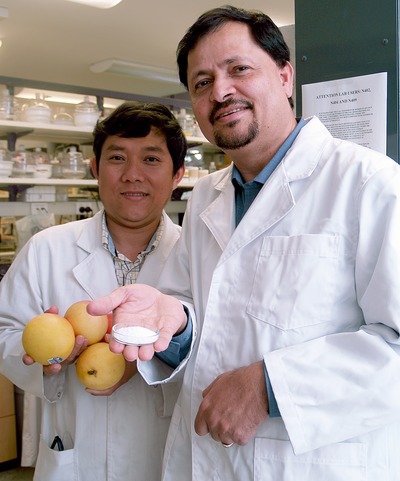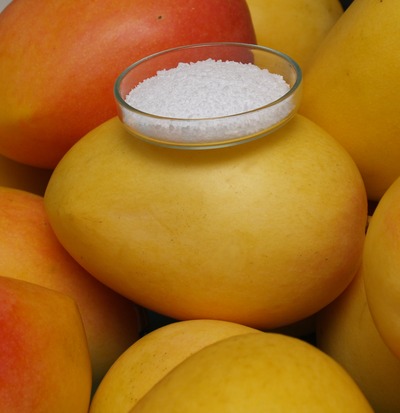New technology takes the danger out of ripening fruit
Who knew ripening fruit could be so dangerous? Bananas, mangoes, avocados, citrus and tomatoes are all picked at ‘commercial maturity’, when they are hard and green, but in a mature state, before ripening has started. Compressed ethylene gas, which is stored in cylinders, has traditionally been used to ripen and colour these fruits, but in its compressed form it is highly volatile and can cause explosive accidents.
New technology could take the danger out of ripening fruit, however. Materials scientists from the University of Queensland (UQ) have developed a way to convert the unstable ethylene gas into a more stable powder form.
“Compressed gas can be expensive, difficult to handle and unsafe,” said Professor Bhesh Bhandari, who developed the technology along with PhD student Binh Ho. “To try to overcome these disadvantages, we have been looking at methods to encapsulate the gas in various types of solid materials to create a safe and convenient powder form.”

The research team, from UQ’s School of Agriculture and Food Sciences, identified a starch derivative biological material that has cavities in its crystalline structure that encapsulate the ethylene gas. The ethylene gas is released from the complex powder when the temperature and humidity are raised.
“We have developed a food-grade, environmentally friendly biological powder that can release the ethylene gas very quickly in humid and high-temperature conditions,” Ho said. “This would make handling the ethylene much easier and safer and allow for very small amounts to be used to ripen small batches of fruit.

“It could also potentially be placed in trucks that transport the fruit from the farm so that the fruit arrives at the market perfectly ripe.”
Professor Bhandari presented the findings at the International Drying Symposium in China, where he was also presented with the Excellence in Drying Award, which is presented once every four years to the world’s top researcher in recognition of their achievements in the transfer of fundamentals into practice. The award is presented by the International Drying Symposium and is sponsored by the French Association for Drying in Industry and Agriculture.
Professor Bhandari and Ho are working with UniQuest, UQ’s research commercialisation company, to prepare the technology for industry investment and licensing opportunities. An application for patent protection for the technology has been made.
Australia's southern bluefin tuna achieves sustainable certification
Claimed as a world's first, the Australian Southern Bluefin Tuna Industry Association has had...
New Zealand wine industry’s report shows commitment to sustainability
The 2025 New Zealand Winegrowers Sustainability Report highlights the ongoing efforts by NZ grape...
Futureproofing Aussie wines with mildew-resistant grapevines
CSIRO and Treasury Wine Estates have partnered on a project in South Australia to help protect...














